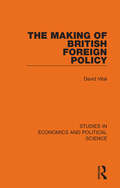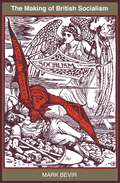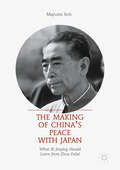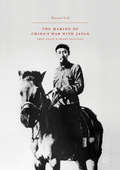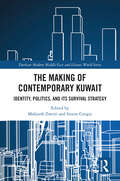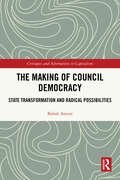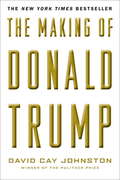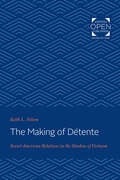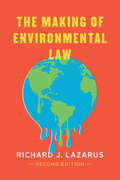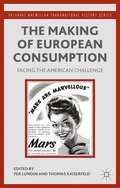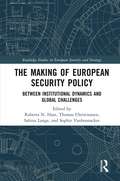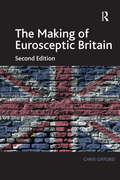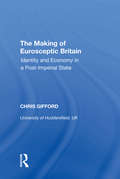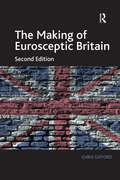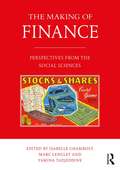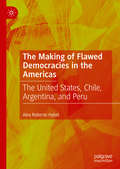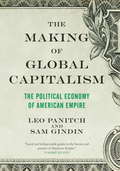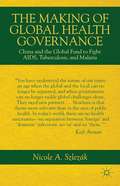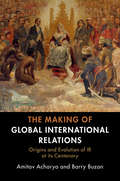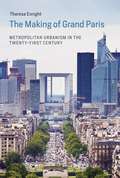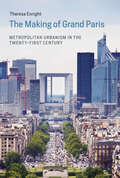- Table View
- List View
The Making of British Foreign Policy (Studies in Economics and Political Science)
by David VitalHow is foreign policy made? Who makes it? To what conscious and unconscious influences are policy-makers subject? What is distinctive about the immensely complex process as it unfolds in Britain? And what, therefore, is distinctive and characteristic about Britain’s foreign policy today? Who in Britain, has the decisive word? Why is the Foreign Office the king-pin of the system? Why does Parliament count for so little? Does public opinion count at all? Originally published in 1968, these are some of the questions which this book considers in the course of a tightly argued but very readable analysis. Some had been considered on their own elsewhere, but this study represented the first attempt by a contemporary political scientist to pull together, in brief compass, all the relevant threads – including the constitutional, the political, the institutional and the sociological. It is done, moreover, on the basis of a sharp assessment of the type of foreign policy problem that most notably confronted Britain at the time. The author has been successively journalist, official of the Israel Government, and university lecturer in politics. Throughout, his special interests and activities have been in the sphere of international affairs and it was while teaching International Relations at the University of Sussex that he wrote this book. He combines the experience of one who has seen the policy being made from the inside with the theoretical insight of the political scientist; he assesses with a sympathetic but unemotional detachment the constraints on the formation of British foreign policy.
The Making of British Socialism
by Mark BevirA compelling look at the origins of British socialismThe Making of British Socialism provides a new interpretation of the emergence of British socialism in the late nineteenth century, demonstrating that it was not a working-class movement demanding state action, but a creative campaign of political hope promoting social justice, personal transformation, and radical democracy. Mark Bevir shows that British socialists responded to the dilemmas of economics and faith against a background of diverse traditions, melding new economic theories opposed to capitalism with new theologies which argued that people were bound in divine fellowship.Bevir utilizes an impressive range of sources to illuminate a number of historical questions: Why did the British Marxists follow a Tory aristocrat who dressed in a frock coat and top hat? Did the Fabians develop a new economic theory? What was the role of Christian theology and idealist philosophy in shaping socialist ideas? He explores debates about capitalism, revolution, the simple life, sexual relations, and utopian communities. He gives detailed accounts of the Marxists, Fabians, and ethical socialists, including famous authors such as William Morris and George Bernard Shaw. And he locates these socialists among a wide cast of colorful characters, including Karl Marx, Henry Thoreau, Leo Tolstoy, and Oscar Wilde.By showing how socialism combined established traditions and new ideas in order to respond to the changing world of the late nineteenth century, The Making of British Socialism turns aside long-held assumptions about the origins of a major movement.
The Making of China’s Peace with Japan
by Mayumi ItohThis text provides a comprehensive re-examination of post-World War II Sino-Japanese relations, focusing notably on Chinese premier Zhou Enlai's foreign policy toward Japan. It juxtaposes Zhou's stance on issues which confront current bilateral relations -- such as the "history issues" and the territorial dispute over the Senkaku (or Diaoyu) Islands -- with the current Chinese foreign policy of President Xi Jinping. Through in-depth analysis of primary sources, including newly published writings and biographies of Zhou as well as newly released diplomatic archival documents, this book reveals the truth behind secret negotiations between China and Japan and sheds new light on contemporary Sino-Japanese relations.
The Making of China’s War with Japan
by Mayumi ItohThis cutting edge study examines the career of Chinese politician and diplomat Zhou Enlai (1898-1976) and assesses his leadership role in the Communist Party of China's (CPC) strategy against the Japanese invasion of China which established the foundation for post-World War II Sino-Japanese relations. It considers how Zhou dealt with Japanese imperialism during his midcareer, from the May Fourth Movement to the formation of the second United Front between the Chinese Nationalist Party (KMT) and the CPC against Japan, which paved the way for the Chinese victory in the second Sino-Japanese War. Addressing significant moments such as the Manchurian Incident and the Xi'an Incident, it provides a thought-provoking reexamination of Zhou's involvement in the May Fourth Movement of 1919, the first national grassroots movement in the modern history of China calling for anti-imperialism and nationalism, and also of his time in Europe, as essential background to understand the birth of the CPC and Zhou's role in it, as well as Zhou's collaboration with Zhang Xueliang, the culprit of the Xi'an Incident. Through an in-depth analysis of primary sources, including Zhou's own writings, the oral history of Chinese officials, and newly declassified diplomatic archives, this work presents a comprehensive and accurate account of Zhou's career against the backdrop of Japanese imperialism.
The Making of Contemporary Kuwait: Identity, Politics, and its Survival Strategy (Durham Modern Middle East and Islamic World Series)
by Mahjoob Zweiri and Sinem CengizThis book explores the contemporary history, governance, foreign policy, political economy, culture, and society of Kuwait. It highlights the dynamics of the country, putting forward both an overview of each subject covered and new research findings. It begins by providing a historical understanding of state formation and goes on to examine state structure, including the ruling monarchy, state legitimacy, and the creation of the Constitution and the National Assembly. It considers foreign policy, including the tools of diplomacy, the state’s regional and international approach, and the factors that have formed and reformed Kuwait’s strategic policy in the global arena. It assesses the economy, including rentierism, the labour market both for locals and for migrants, the class system, and the process of Kuwaitization; and it discusses Kuwaiti society and national identity, as well as investigates issues of women, civil society, youth, and the Bidoon minority. Overall, the book provides a full and detailed analysis of contemporary Kuwait and of the factors which are bringing about new developments.
The Making of Council Democracy: State Transformation and Radical Possibilities (Critiques and Alternatives to Capitalism)
by Babak Amini“Council democracy” is a particular form of democratic socialism that strives towards democratic self-governance on the basis of active, free, and associated individuals working cooperatively within a federated council system. Both in political practice and in social theory, “council democracy” has resurfaced periodically in the past, most notably in the interwar period, in the “long 1960s,” and since the turn of the 21st century. This book offers a novel theoretical and methodological approach to the study of “council democracy.” It focuses on the processes that led to the emergence of two of the foundational and most radical instances of “council democratic” movements in Germany during the German Revolution (1918-1919) and in Italy during the biennio rosso (1919-1920). With all their diversities, ambiguities, and shortcomings, these movements, in varying degrees, sought democratic alternatives to autocratic relations, from local to state levels, and to economic relations, from workplace to national levels. The book shows how the processes through which state-led war mobilization transformed the contours of class struggle laid the ground for the emergence of “council democratic” movements with specific characteristics in Germany and Italy and not in the United Kingdom and France.
The Making of Donald Trump
by David Cay Johnston<P>The culmination of nearly 30 years of reporting on Donald Trump, Pulitzer Prize-winning investigative reporter, David Cay Johnston, takes a revealingly close look at the mogul's rise to power and prominence. <P> Covering the long arc of Trump's career, Johnston tells the full story of how a boy from a quiet section of Queens, NY would become an entirely new, and complex, breed of public figure. Trump is a man of great media savvy, entrepreneurial spirit, and political clout. Yet his career has been plagued by legal troubles and mounting controversy. <P>From the origins of his family's real estate fortune, to his own too-big-to-fail business empire; from his education and early career, to his whirlwind presidential bid, The Making of Donald Trump provides the fullest picture yet of Trump's extraordinary ascendency. Love him or hate him, Trump's massive influence is undeniable, and figures as diverse as Woody Guthrie (who wrote a scathing song about Trump's father) and Red Scare prosecutor Roy Cohn, mob bosses and high rollers, as well as the average American voter, have all been pulled into his orbit. <P>Drawing on decades of interviews, financial records, court documents, and public statements, David Cay Johnston, who has covered Trump more closely than any other journalist working today, gives us the most in-depth look yet at the man who would be president. <P><b>A New York Times Bestseller</b>
The Making of Détente: Soviet-American Relations in the Shadow of Vietnam
by Keith L. NelsonOriginally published in 1995. In the early 1970s, largely as a result of the debilitating struggle in Vietnam, the United States began to reassess and redefine its basic approach to East-West relations. At the same time, the Soviet Union was awakening to the liabilities that a continuing and unregulated state of hostility would impose on its own internal and external agenda. Keith Nelson details the circumstances and traces the steps that led to the first significant accommodation and easing of tension between the superpowers during the Cold War. "In this important study, Keith Nelson explains the detente period in an imaginative, convincing, and impressively scholarly manner. Although there have been scores of books and memoirs on the subject, none have done the job quite like Nelson's. In particular, he has used post-glasnost Russian memoirs and monographs—and, especially, his own interviews with such key players as Dobrynin and Arbatov—to present one of the most intelligent Kremlinological studies I have ever seen." —Melvin Small, Wayne State University
The Making of English National Identity
by Krishan KumarWhy is English national identity so enigmatic and so elusive? Why, unlike the Scots, Welsh, Irish and most of continental Europe, do the English find it so difficult to say who they are? The Making of English National Identity, first published in 2003, is a fascinating exploration of Englishness and what it means to be English. Drawing on historical, sociological and literary theory, Krishan Kumar examines the rise of English nationalism and issues of race and ethnicity from earliest times to the present day. He argues that the long history of the English as an imperial people has, as with other imperial people like the Russians and the Austrians, developed a sense of missionary nationalism which in the interests of unity and empire has necessitated the repression of ordinary expressions of nationalism. Professor Kumar's lively and provocative approach challenges readers to reconsider their pre-conceptions about national identity and who the English really are.
The Making of Environmental Law
by Richard J. LazarusAn updated and passionate second edition of a foundational book. How did environmental law first emerge in the United States? Why has it evolved in the ways that it has? And what are the unique challenges inherent to environmental lawmaking in general and in the United States in particular? Since its first edition, The Making of Environmental Law has been foundational to our understanding of these questions. For the second edition, Richard J. Lazarus returns to his landmark book and takes stock of developments over the last two decades. Drawing on many years of experience on the frontlines of legal and policy battles, Lazarus provides a theoretical overview of the challenges that environmental protection poses for lawmaking, related to both the distinctive features of US lawmaking institutions and the spatial and temporal dimensions of ecological change. The book explains why environmental law emerged in the manner and form that it did in the 1970s and traces how it developed over sequent decades through key laws and controversies. New chapters, composing more than half of the second edition, examine a host of recent developments. These include how Congress dropped out of environmental lawmaking in the early twenty-first century; the shifting role of the judiciary; long-overdue efforts to provide environmental justice to disadvantaged communities; and the destabilization of environmental law that has resulted from the election of Presidents with dramatically clashing environmental policies. As the nation’s partisan divide has grown deeper and the challenge of climate change has dramatically raised the perceived stakes for opposing interests, environmental law is facing its greatest challenges yet. This book is essential reading for understanding where we have been and what challenges and opportunities lie ahead.
The Making of Environmental Law
by Richard J. LazarusAn updated and passionate second edition of a foundational book. How did environmental law first emerge in the United States? Why has it evolved in the ways that it has? And what are the unique challenges inherent to environmental lawmaking in general and in the United States in particular? Since its first edition, The Making of Environmental Law has been foundational to our understanding of these questions. For the second edition, Richard J. Lazarus returns to his landmark book and takes stock of developments over the last two decades. Drawing on many years of experience on the frontlines of legal and policy battles, Lazarus provides a theoretical overview of the challenges that environmental protection poses for lawmaking, related to both the distinctive features of US lawmaking institutions and the spatial and temporal dimensions of ecological change. The book explains why environmental law emerged in the manner and form that it did in the 1970s and traces how it developed over sequent decades through key laws and controversies. New chapters, composing more than half of the second edition, examine a host of recent developments. These include how Congress dropped out of environmental lawmaking in the early twenty-first century; the shifting role of the judiciary; long-overdue efforts to provide environmental justice to disadvantaged communities; and the destabilization of environmental law that has resulted from the election of Presidents with dramatically clashing environmental policies. As the nation’s partisan divide has grown deeper and the challenge of climate change has dramatically raised the perceived stakes for opposing interests, environmental law is facing its greatest challenges yet. This book is essential reading for understanding where we have been and what challenges and opportunities lie ahead.
The Making of Environmental Law
by Richard J. LazarusAn updated and passionate second edition of a foundational book. How did environmental law first emerge in the United States? Why has it evolved in the ways that it has? And what are the unique challenges inherent to environmental lawmaking in general and in the United States in particular? Since its first edition, The Making of Environmental Law has been foundational to our understanding of these questions. For the second edition, Richard J. Lazarus returns to his landmark book and takes stock of developments over the last two decades. Drawing on many years of experience on the frontlines of legal and policy battles, Lazarus provides a theoretical overview of the challenges that environmental protection poses for lawmaking, related to both the distinctive features of US lawmaking institutions and the spatial and temporal dimensions of ecological change. The book explains why environmental law emerged in the manner and form that it did in the 1970s and traces how it developed over sequent decades through key laws and controversies. New chapters, composing more than half of the second edition, examine a host of recent developments. These include how Congress dropped out of environmental lawmaking in the early twenty-first century; the shifting role of the judiciary; long-overdue efforts to provide environmental justice to disadvantaged communities; and the destabilization of environmental law that has resulted from the election of Presidents with dramatically clashing environmental policies. As the nation’s partisan divide has grown deeper and the challenge of climate change has dramatically raised the perceived stakes for opposing interests, environmental law is facing its greatest challenges yet. This book is essential reading for understanding where we have been and what challenges and opportunities lie ahead.
The Making of European Consumption
by Per Lundin Thomas KaiserfeldAmerican ideals and models feature prominently in the master narrative of post-war European consumer societies. This book demonstrates that Europeans did not appropriate a homogenous notion of America, rather post-war European consumption was a process of selective appropriation of American elements.
The Making of European Security Policy: Between Institutional Dynamics and Global Challenges (Routledge Studies in European Security and Strategy)
by Roberta N. HaarThis volume addresses how and in what capacity the European Union and its member states are able to respond to fundamental shifts occurring in global politics and remain relevant for the future. The changing nature of the international system is subject to considerable contestation among scholars, with many claiming that the fundamentals of the post-war international system are being rewritten. This volume brings together prominent scholars in the field of European security to address a range of pertinent issues related to Europe’s role in the context of evolving global challenges. The first section focuses on whether the EU is an actor with a strategic nature and the means to act on a global security strategy. The second section considers the institutional dynamics and the approaches at the EU’s disposal to fulfil its possible intended global roles. The third section addresses Europe’s most important strategic relationship—the partnership it has with the United States. This section considers the recalibration of the transatlantic relationship in light of the changing international system and the reorientation of U.S. foreign policy. This book will be of much interest to students of European Union policy, European Security policy, European Foreign policy and International Relations in general.
The Making of Eurosceptic Britain
by Chris GiffordWhat has been the political impact of the Eurozone Debt Crisis in the UK? To what extent have the bank collapses and bailouts reinforced Britain’s Eurosceptic trajectory? In this revised and updated second edition Chris Gifford addresses these key questions reflecting on the Labour government’s approach to Europe while exploring the extensive mobilisation of Eurosceptic forces in opposition to the Conservative-led coalition government. The book examines the extent to which Euroscepticism has become dominant within both the Conservative leadership and the bulk of its parliamentary party and how this has affected the relationship of the coalition government with the European Union. By placing current attitudes to Europe in relation to the wider history of Britain’s post war interaction with its continental neighbours the author shows how British Euroscepticism is structural in nature and a persistent and institutionalised feature of UK Politics.
The Making of Eurosceptic Britain: Identity and Economy in a Post-Imperial State
by Chris GiffordOffering a radical interpretation of a major political issue, Chris Gifford moves beyond existing narrative and institutional accounts of Britain and Europe to present a theoretically coherent and unique perspective on this troubled relationship. He acknowledges that populist Euroscepticism has become fundamental to constituting Britain and 'Britishness' in a post-imperial context, despite membership of the European Union. Organized chronologically, this interesting study provides lucid overviews of key periods in the British-European Union relationship. It combines political economy with political identity to illustrate how forms of Euroscepticism have become embedded across the British political class and culture. The book focuses not on outlining history or the impact of British integration on British institutions, but on the ways in which elite behaviour towards European integration should be analyzed as practices and discourses that use Euroesceptism to construct Britain and distinctive British political projects.
The Making of Eurosceptic Britain: Identity and Economy in a Post-Imperial State
by Chris GiffordWhat has been the political impact of the Eurozone Debt Crisis in the UK? To what extent have the bank collapses and bailouts reinforced Britain’s Eurosceptic trajectory? In this revised and updated second edition Chris Gifford addresses these key questions reflecting on the Labour government’s approach to Europe while exploring the extensive mobilisation of Eurosceptic forces in opposition to the Conservative-led coalition government. The book examines the extent to which Euroscepticism has become dominant within both the Conservative leadership and the bulk of its parliamentary party and how this has affected the relationship of the coalition government with the European Union. By placing current attitudes to Europe in relation to the wider history of Britain’s post war interaction with its continental neighbours the author shows how British Euroscepticism is structural in nature and a persistent and institutionalised feature of UK Politics.
The Making of Federal Coal Policy
by Robert H. NelsonThe Making of Federal Coal Policy provides a unique record of--as well as important future perspectives on--one of the most significant ideological conflicts in national policymaking in the last decade. The management of federally owned coal, almost one-third of the U.S.'s total coal resources, has furnished an arena for the contest between energy development and environmental protection, as well as between the federal government and the states. Robert H. Nelson has written an important historical document and a useful guide for policy analysts.
The Making of Finance: Perspectives from the Social Sciences
by Isabelle Chambost Marc Lenglet Yamina TadjeddineUsing a variety of theoretical frameworks drawn from the social sciences, the contributions in this edited collection offer a critical perspective on the dominant paradigms used in contemporary financial activities. Through a detailed study of the organisation and functioning of financial intermediaries and institutions, the contributors to this volume analyse ‘finance in the making’, by shedding light on the structuring of banking and financial systems, on their capacity to prescribe action and control, on their modes of regulation and, more generally, on the process of financialisation. Contributions presented in this volume have been written by authors working within the ‘social studies of finance’ tradition, a research programme that emerged twenty years ago, with the aim of addressing a diversity of financial fieldworks and related theoretical questions. This book, therefore, sheds light on different areas that are representative of contemporary financial realities. Specifically, it first studies the work of financial employees: traders, salespeople, investment managers, financial analysts, investment consultants, etc. but also provides an analysis of a range of financial instruments: financial schemes and contracts, financial derivatives, socially responsible investment funds, as well as market rules and regulations. Finally, it puts into perspective the organisations contributing to this financial reality: those developing and selling financial services (retail banks, brokerage houses, asset management firms, private equity firms, etc.), and also those contributing to the regulation of such activities (banking regulators, financial market authorities, credit rating agencies, the State, to name a few). Each text can be read without any specific knowledge of finance; the book is thus addressed to anyone willing to better understand the intricacies of contemporary financial realities.
The Making of Flawed Democracies in the Americas: The United States, Chile, Argentina, and Peru
by Alex Roberto HybelThis book strives to answer two interrelated questions: Why have certain states in the Americas been more successful than others at creating stable democratic regimes? Why have certain states in the Americas failed to create stable democratic regimes? To answer both questions, the author focuses on four states – the United States, Argentina, Chile, and Peru. Throughout the analysis, he isolates and evaluates the conditions that helped or hindered the development of each state and of its political regime. He presents his conclusions in the form of time-related explanatory hypotheses. By identifying and examining the conditions that brought about the transformation of each states and of its political regimes, this study ultimately facilitates a discussion of the future of democracy in each of these countries as well as in the world.
The Making of Global Capitalism: The Political Economy Of American Empire
by Sam Gindin Leo PanitchThe all-encompassing embrace of world capitalism at the beginning of the twenty-first century was generally attributed to the superiority of competitive markets. Globalization had appeared to be the natural outcome of this unstoppable process. But today, with global markets roiling and increasingly reliant on state intervention to stay afloat, it has become clear that markets and states aren't straightforwardly opposing forces.In this groundbreaking work, Leo Panitch and Sam Gindin demonstrate the intimate relationship between modern capitalism and the American state, including its role as an "informal empire" promoting free trade and capital movements. Through a powerful historical survey, they show how the US has superintended the restructuring of other states in favor of competitive markets and coordinated the management of increasingly frequent financial crises.The Making of Global Capitalism, through its highly original analysis of the first great economic crisis of the twenty-first century, identifies the centrality of the social conflicts that occur within states rather than between them. These emerging fault lines hold out the possibility of new political movements transforming nation states and transcending global markets.
The Making of Global Health Governance: China and the Global Fund to Fight AIDS, Tuberculosis, and Malaria
by Nicole A. SzlezákA study of governance in the emerging global domain, this book traces the evolution of global public policy making by focusing on four entities: a globalizing sector (health); a global disease (HIV/AIDS); a global organization (the Global Fund); and a major sovereign state (China).
The Making of Global International Relations: Origins and Evolution of IR at its Centenary (Cambridge Studies In International Relations Ser. #135)
by Barry Buzan Amitav AcharyaThis book presents a challenge to the discipline of international relations (IR) to rethink itself, in the light of both its own modern origins, and the two centuries of world history that have shaped it. By tracking the development of thinking about IR, and the practice of world politics, this book shows how they relate to each other across five time periods from nineteenth-century colonialism, through two world wars, the Cold War and decolonization, to twenty-first-century globalization. It gives equal weight to both the neglected voices and histories of the Global South, and the traditionally dominant perspectives of the West, showing how they have moved from nearly complete separation to the beginnings of significant integration. The authors argue that IR needs to continue this globalizing movement if it is to cope with the rapidly emerging post-Western world order, with its more diffuse distribution of wealth, power and cultural authority.
The Making of Grand Paris: Metropolitan Urbanism in the Twenty-First Century
by Theresa EnrightIn 2007 the French government announced the "Grand Paris" initiative. This ambitious project reimagined the Paris region as integrated, balanced, global, sustainable, and prosperous. Metropolitan solidarity would unite divided populations; a new transportation system, the Grand Paris Express, would connect the affluent city proper with the low-income suburbs; streamlined institutions would replace fragmented governance structures. Grand Paris is more than a redevelopment plan; it is a new paradigm for urbanism. In this first English-language examination of Grand Paris, Theresa Enright offers a critical analysis of the early stages of the project, considering whether it can achieve its twin goals of economic competitiveness and equality. Enright argues that by orienting the city around growth and marketization, Grand Paris reproduces the social and spatial hierarchies it sets out to address. For example, large expenditures for the Grand Paris Express are made not for the public good but to increase the attractiveness of the region to private investors, setting off a real estate boom, encouraging gentrification, and leaving many residents still unable to get from here to there. Enright describes Grand Paris as an example of what she calls "grand urbanism," large-scale planning that relies on infrastructural megaprojects to reconfigure urban regions in pursuit of speculative redevelopment. Democracy and equality suffer under processes of grand urbanism. Given the logic of commodification on which Grand Paris is based, these are likely to suffer as the project moves forward.
The Making of Grand Paris: Metropolitan Urbanism in the Twenty-First Century (Urban and Industrial Environments)
by Theresa EnrightA critical examination of metropolitan planning in Paris—the “Grand Paris” initiative—and the building of today's networked global city.In 2007 the French government announced the “Grand Paris” initiative. This ambitious project reimagined the Paris region as integrated, balanced, global, sustainable, and prosperous. Metropolitan solidarity would unite divided populations; a new transportation system, the Grand Paris Express, would connect the affluent city proper with the low-income suburbs; streamlined institutions would replace fragmented governance structures. Grand Paris is more than a redevelopment plan; it is a new paradigm for urbanism. In this first English-language examination of Grand Paris, Theresa Enright offers a critical analysis of the early stages of the project, considering whether it can achieve its twin goals of economic competitiveness and equality.Enright argues that by orienting the city around growth and marketization, Grand Paris reproduces the social and spatial hierarchies it sets out to address. For example, large expenditures for the Grand Paris Express are made not for the public good but to increase the attractiveness of the region to private investors, setting off a real estate boom, encouraging gentrification, and leaving many residents still unable to get from here to there.Enright describes Grand Paris as an example of what she calls “grand urbanism,” large-scale planning that relies on infrastructural megaprojects to reconfigure urban regions in pursuit of speculative redevelopment. Democracy and equality suffer under processes of grand urbanism. Given the logic of commodification on which Grand Paris is based, these are likely to suffer as the project moves forward.
